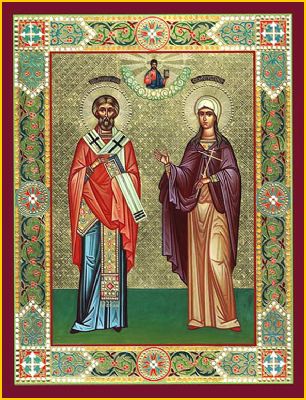|
|||
|---|---|---|---|
| This weekly bulletin insert complements the curriculum published by the Department of Christian Education of the Orthodox Church in America. This and many other Christian Education resources are available at http://dce.oca.org. | |||

The Church celebrates the memory of a martyred married couple, Sts. Chrysanthus and Daria, who lived in third-century Rome. He was born in the Egyptian city of Alexandria; she was a native of Athens. Chrysanthus had a good education and a sharp intellect. When he first came from Egypt to Rome with his father and observed Roman society, the worship of pagan gods struck him as childish. It was based on fanciful stories with no moral grounding. Trusting his own doubts, he began reading about other philosophies, and among them were writings describing Christianity. Impressed, Chrysanthus decided to learn more about Christianity from an actual Christian. Gathering his questions, he visited an elderly man who had been described as a Christian sage. They talked at length, and Chrysanthus decided not only to become a Christia but to proclaim the Gospel openly. Chrysanthus' father was not pleased. As a member of Rome's military elite he had a position to protect, and he certainly didn't want his son mixed up with a group of rebels who defied the government and put their faith in a deity who had been executed as a common criminal. He thought of a way to reach his son and to turn the young man from his dangerous new ideas. He hired beautiful young women to seduce Chrysanthus, who struggled hard with temptation but managed to keep his resolve to be dedicated only to Christ. The father made one last effort, and brought to his son a lovely girl named Daria, whose life had been dedicated to the gods. When Chrysanthus asked her how she could possibly worship statues and idols, she had a ready answer. Of course, she said, everyone knew that the idols were not to be worshipped. They were only there to focus people's attention on the real gods: fire, wind, rain. Here was someone, Chrysanthus realized, who was more interested in truth than in mere seduction. They had long discussions, and he was able to show her that God through His Son had created fire, wind, rain and all natural things, so that He was the One to be worshipped. Finally, she willingly accepted baptism. The two were married, and made a mutual decision to live in celibacy. They would let their zeal for Christ be the thing that united them, and use all their energy to preach His salvation. Sacrificing the pleasures of the world, they could travel more lightly on the path of salvation.
The husband and wife brought many new people into the Church, enough so that they attracted the attention of the Roman government. They were martyred in about 237, but their names have shone through Christian history ever since. The married-and-celibate model is not common today, but it fit these two saints' desire to give everything to Christ. It also reminds us that virginity was not always seen as a virtue only for women. Chrysanthus exemplifies the fact that men, too, could and can live as virgins dedicated to the Lord. |
|||
